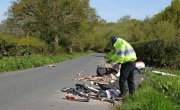Circular Economy Package: A mixed bag for reuse
Michal Len, Director of RREUSE, an organisation representing European social enterprises promoting reuse, repair and recycling, assesses the Circular Economy Package’s reuse credentials.
 Those working in reuse are used to getting mixed bags. So, to truly understand the value in the European Commission’s relaunched Circular Economy Package, we first need to sort through what we’ve got. In RREUSE’s view, some aspects seem good to go, some need major repairs, while others could be dangerous and need to be sent off for recycling!
Those working in reuse are used to getting mixed bags. So, to truly understand the value in the European Commission’s relaunched Circular Economy Package, we first need to sort through what we’ve got. In RREUSE’s view, some aspects seem good to go, some need major repairs, while others could be dangerous and need to be sent off for recycling!
First up, the good stuff. There is some encouraging language in the Waste Framework Directive proposals on opening up access for reuse organisations to waste collection facilities and the aspiration to boost repair by improving availability of spare parts and service manuals as part of the Circular Economy Action Plan. However, this looks like nice words, without the legal-binding force that we need.
Critically, despite a new proposed methodology, there is no legally-binding separate target for preparation for reuse, only encouragement for member states that want to do this. It’s vitally important that preparation for reuse becomes a clear part of the legal framework, and is not left as an afterthought for voluntary action. France, Spain, and the Flemish region of Belgium have managed to do this – it’s time the rest of the EU followed. We’ll need to work with the European Parliament and member states to try and put back these missing pieces.
Another aspect of the proposals that feels half-hearted is the effort to boost the ease of repair, upgrade and durability of products – a clear problem of these days of throwaway appliances and phones where even a battery can’t be changed. We feel that the commission’s proposed criteria to differentiate extended producer responsibility (EPR) fees goes in the right direction but it isn’t enough. Significant product categories such as textiles and furniture are not even covered by EPR in most countries.
For electric and electronic products, introducing mandatory repair-friendly criteria in the EU’s green product standards (known as Ecodesign implementing measures) could be another way to achieve this. Making repair costs cheaper through zero VAT on repair services could be another.
Definitions are vitally important. The world of reuse and repair contains actors ranging from online platforms, private repair companies, social enterprise reuse centres, antiques dealers, flea markets, charity shops, to name just a few. It is clear that some of these organisations could benefit directly from the proposed changes in EU waste law through better access to reusable goods, whilst others could be subjected to new, burdensome requirements that could be harmful. In particular, we are worried that opening up the scope of the definition of ‘preparing for reuse’, could risk subjecting many reuse operators that don’t work with waste to new data reporting requirements or possibly even specifications that would result in creating obstacles for them rather than drivers.
Furthermore, without sufficient detail in the new proposals about how to monitor these activities, it may prove a headache for member states trying to calculate their national statistics.
Again, we’ll be calling for more clarity and assurances that reuse operators will benefit from these changes, not be harmed by them.
Another important missing aspect is encouragement and support for the role of social enterprises. Such organisations working in waste management provide quality jobs and training opportunities, in many cases, working with people who have difficulties entering the mainstream labour market. Asking member states to promote ‘social clauses’ in public tendering contracts would boost this important, and often forgotten, side-benefit of reuse for socio-economic inclusion and cohesion.
There is a lot to do. Discussions between the European Council and Parliament are likely to last at least another year before we have new waste legislation in place. But this period is also an opportunity to try to throw out the worst elements and fix up the more promising ones. RREUSE and our partners are used to repair work; we’re already on the case.






